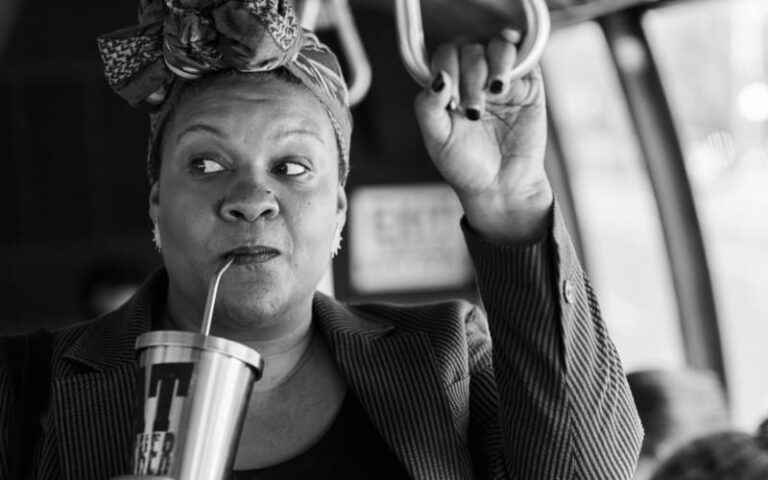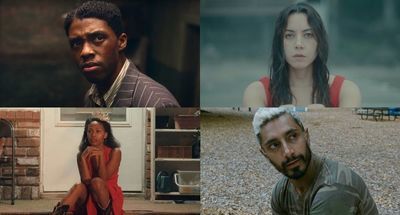DXFF2020: Interview with COLLECTIVE director Alexander Nanau
Alexander Nanau’s sprawling investigative journalism exposé, Collective follows a team of reporters as they unearth a Romanian healthcare cover-up, sparking a national revolt for government accountability. Over two hours in length, Collective zig-zags through convoluted webs of fraudulent hospital tactics, gag orders, whistleblowers, and evasive corrupt officials — ultimately unearthing corruption rotting at Romania’s core.
Known among arthouse pockets in Romania and Germany, in the 2000’s Alexander Nanau quickly became one of the pivotal figures of the Romanian New Wave movement. He became known for his signature, raw, gritty style of documenting through his vivid, feverish take on fly-on-the-wall directing. His first feature, The World According to Ion B, won an International Emmy in 2009, and his 2014 feature Toto and His Sisters, about a band of Bucharest kids trying to escape the fringes of poverty, is still relevant today.
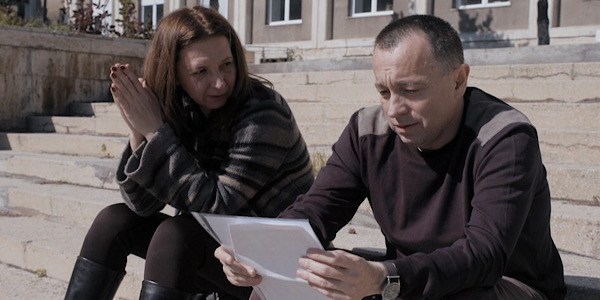
We spoke to the director about the critical success of Collective following his press run at the 2020 edition of the Double Exposure Investigative Film Festival.
Monique for Film Inquiry: Hi Alexander! Thanks for the time to speak with me today, I understand it’s been quite a long press run for you. Congratulations on the reception of Collective and the Oscar bid! I saw Collective last year during its run at TIFF, and I have to say, I’m struck by how relevant the film has become on a global scale. While it used to exist within this domestic vacuum, it’s now become a bit of a caveat, emblematic of not only Romania’s slip-up on healthcare, but the world’s.
It’s quite remarkable how the film manages to track the entire timeline as it played out on the political field. When did you realize that the Collective story had the machinations to unravel into this healthcare scandal?
Alexander Nanau: After we started to follow the journalists, we gradually started to understand what they were investigating, because they also did not tell us the details of the investigation. So they allowed us to, you know, be with them and accompany them, but they didn’t brief us. So in a way, I was discovering what they were after while I was shooting. And I think I only understood how big it was, once the numbers came in, and were confirmed that the disinfectants are really diluted and that so and so many hospitals are having them. And then because Romania has had a big problem with hospital infections, so there’s, at least in every family, there is somebody who got an infection while being in the hospital. So a lot of people are fighting these hospital infections. And so it was gradual. For sure once it was out things were happening pretty fast. And once the guy killed himself, it was clear that you know, it was a bigger story.
And I think it became really big when they understood that the Secret Service was after this for 10 years and that they were briefing the political sphere for 10 years. But obviously, because everybody was part of it, like from, you know, high ranking politicians, to hospital managers, to the doctors in hospitals that were responsible for acquisitions — it was clear that it was big, you know, a big network in the hospitals.
I’m interested in the legal process of editing the film. Since you were dealing with an investigation and a developing situation, were you particularly worried about any legal or safety implications, especially when dealing with whistleblowers?
Alexander Nanau: Oh, yes, we were, but we were very cautious. And we knew, for example, that the Secret Service was listening to my phone and some people on my team’s phone. We had a source that informed us about that. And so what we did, is that we really took measures, and every evening, for example, our footage was copied into four sources that were spreading with different people going in different directions, hiding them, and then now and then we will also get him out of the country. So we were prepared, let’s say for whatever, you know: if they break into our office. Ten years ago with the project that we never made in the end, but it was also a project that implicated people that were in contact with the Secret Service, and an old story from the 80s. But we had the experience that they broke into our office and really went through all our documents and data. So this time, we were prepared not to be damaged if they would break into our studio.
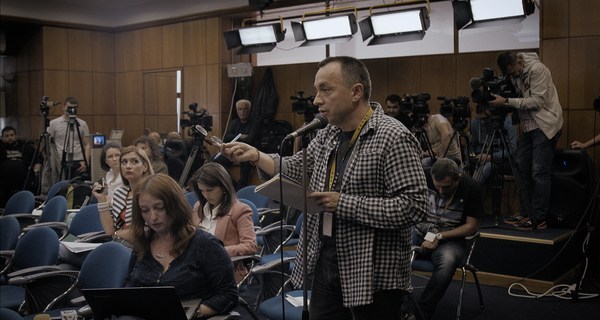
That’s definitely a risky way to film. What’s the reception of the film been like in Romania, seeing that the dust has now settled on the initial scandal?
Alexander Nanau: The reception from the people was very good. We had really record numbers in terms of admissions. So in two weeks to fill may 25,000, missing admissions in cinema, which for that matter, is a lot of Romania because people are not used to going and watching documentaries in cinema. So I mean, the highest numbers until now were maybe 8,000 admissions for the documentary, but over a long period of time. And this time, really, people went to see the film in cinemas, but then cinema, the cinemas closed down because of the pandemic, and so the film moved to the HBO Go platform one months later, and there, again, had record-breaking numbers on the platform, um, but for sure, the word also voices, most of the voices from people I know are very corrupt. That said, that’s a political film, it’s a film that is trying to show the good face of somebody like the minister, when in fact, he is not that good person. But these were all voices that are part let’s say, of this ongoing political hysteria in Romania, where, actually the most corrupt are producing fake news all the time.
And the most, you know, the loudest voices are many times from the people that are really corrupt. So, for us, it was not really a problem. And, you know, whoever thinks that we have shot of him in 2016, when Vlad Voiculescu, the minister, was really a normal citizen that was appointed as Minister of Health. However, things that we knew back then, that he will, in the end, three years later go into politics, and that that’s why we made the film it’s so ridiculous to say something like that, that, you know, couldn’t care less. And then as a direct, measurable result, let’s say of the film, is what I learned from journalists that once the film was out the number of whistleblowers the daily number, went up tenfold, so when before that they had, let’s say 10 leads and people writing them and whistleblowers trying to blow the whistle on different things. After the book came out, it went over to 120 people writing every day and trying to get in contact with journalists on different leads and topics.
It’s interesting that it managed to disrupt that culture of secrecy. What was the process of getting Cătălin Tolontan and the entire Sports Gazette team on board for the documentary?
Alexander Nanau: I mean, we approached them and didn’t have very high hopes because they were, I mean, even though it’s a sport because that the team around Tolontan is an investigative team that was working and doing investigations for the last twenty years, they were pretty well known in Romania. And they’re well known as this very feared, investigative journalists who you know, brought down two sports ministers that had to go to prison, and brought down an entire elite of the football world that was corrupt. So he, I mean, he was a feared journalist before. But what was new here is that after the fire, since the whole press in Romania really failed and did not hold anybody accountable for the lies, they were saying, ‘Oh, we’re not really checking on what the government was saying.’ They were the only ones to ask the right questions.
And it is just that after the fire, they changed the field of investigation. So it was the first time they went into healthcare with their investigations. And the first time we met them, we had a meeting with my team, and then and they refused our proposal to, you know, to accompany them to feminism. But then they made up their mind, because, first of all, I think they have seen that our team is working really professionally and that we also had our own sources inside the system. And that it was something serious we were after.
And Tolontan told me much later, actually, after we released the film in Venice, that the reason he called me was that he thought that since a young generation is not reading papers anymore, they’re [the Sports Gazette team] is really losing so much contact to a new generation that is not used to newspapers anymore. They’re a generation that doesn’t really know what the work of a journalist is, and what the difference is between the information you get on social media or information as a result of an investigation of an integral journalist. He thought that maybe a film will show the process of investigative journalism, and maybe that would help to reach more young people to see what the word really is behind the information of quality.
Working with investigative journalists probably had quite a bit of bureaucratic jargon, as a filmmaker, how did you keep that cinematic balance?
Alexander Nanau: Actually, when we started to make the film, I really looked into it, because I always watch everything that’s been done. For example, since I needed a film that would be a film about journalism, I watched like everything that was done in cinema about journalism to understand how they deal with the story, with information, how they build a story around journalism. And then I realized that there are actually no films in Europe about journalism. In the cinema, there’s no culture at all in portraying journalism as an essential part of our democracies.
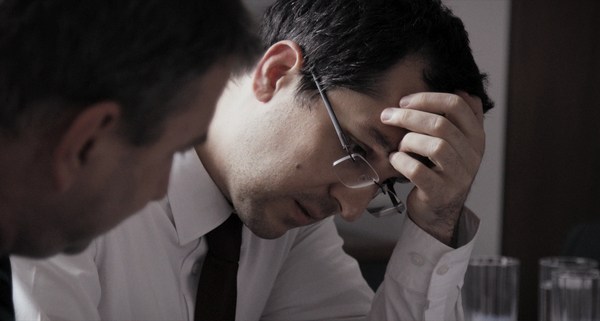
There’s definitely a lack of investigative journalism films. These kinds of investigations are so essential. In North America, we have All the President’s Men and Spotlight, but this has probably been the biggest investigative journalism film I’ve seen out of Europe. What’s also impressive, is the way you successfully tread along multiple narratives, and multiple spheres: the journalistic one, the public one, and the bureaucratic one. Could you tell me a bit about the process?
Alexander Nanau: From the beginning, it was clear to me that I would like to understand, through the film, the relationship between the power and citizens, and what was going on in this whole thing of manipulation, and, basically the power over the private lives of citizens, because that’s what happened. I mean, they use their power to really, you know, in the end, kill people. So they really have power over our private lives. This was a network of many relationships and the press is in between. And it was clear that if you want to understand how society works, we have to see things from different perspectives.
It seemed complicated, and almost impossible to do this in a film — to have so many angles and different perspectives that play together. I really hoped that I would find the key during the editing process to really condense it all into one film.
It all fits together seamlessly, perhaps that’s what’s so great about it. This leads to my final question: obviously the pandemic has made it quite difficult, but are there any future projects in the works that you could share?
Alexander Nanau: Some ideas and projects that I’m developing, but we’re waiting to see when it will again be possible to shoot properly. So, basically, I must say that as a storyteller, what is happening now in the world? I don’t see my role. I don’t think that as storytellers, it is our role now to tell stories about something, that honestly, I don’t understand yet. I think that this whole pandemic is writing its whole story much faster than we as storytellers can reflect on it. So I prefer to take a step back and try to understand what is happening, and I think that the times we’re living in, are really the times for journalists.
‘Collective’ screened at the Double Exposure Film Festival in October. Distributed by Magnolia Pictures in the U.S., ‘Collective’ premieres in theatres and on-demand on November 20.
Does content like this matter to you?
Become a Member and support film journalism. Unlock access to all of Film Inquiry`s great articles. Join a community of like-minded readers who are passionate about cinema – get access to our private members Network, give back to independent filmmakers, and more.
Join now!



